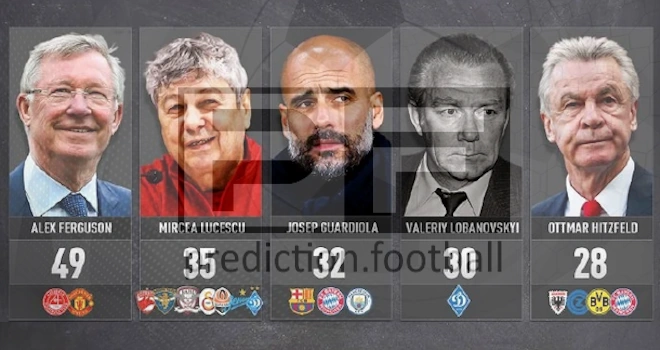Football is not just about the players on the pitch, it's also about the masterminds behind the scenes who shape the tactics, strategies, and overall success of their teams. The most influential managers in football history have left an indelible mark on the sport, revolutionizing how the game is played and perceived. This article explores the careers and contributions of the 10 most influential managers in football history.
Sir Alex Ferguson
Sir Alex Ferguson is widely regarded as one of the greatest football managers of all time. His tenure at Manchester United from 1986 to 2013 was marked by unprecedented success, including 13 Premier League titles, 5 FA Cups, and 2 UEFA Champions League trophies. Ferguson's ability to rebuild and adapt his team over different eras, his tactical acumen, and his leadership qualities have set a benchmark for managerial excellence.
Beyond the trophies, Ferguson was known for his ability to nurture young talent and create a winning culture at Manchester United. His impact on the club and English football is profound, making him a legendary figure in the sport.
Rinus Michels
Rinus Michels, often referred to as the 'father of Total Football' revolutionized the game with his tactical innovations. His work with Ajax and the Netherlands national team in the 1970s introduced a new style of play characterized by fluidity, versatility, and pressing. Michels philosophy emphasized the importance of players being comfortable in multiple positions, which allowed for dynamic and unpredictable football.
His legacy includes winning the European Cup with Ajax and leading the Netherlands to the final of the 1974 World Cup. Michels influence extends beyond his trophies, as his ideas have shaped modern football tactics and inspired countless managers.
Johan Cruyff
Johan Cruyff, a disciple of Rinus Michels, further developed the principles of Total Football and implemented them with great success at Barcelona. Cruyff's tenure as Barcelona manager from 1988 to 1996 saw the club win four consecutive La Liga titles and their first European Cup in 1992. His philosophy of 'Jogo Bonito' (the beautiful game) emphasized technical skill, creativity, and attacking football.
Cruyff's influence on Barcelona laid the foundation for the club's future success and inspired a generation of players and managers, including Pep Guardiola. His impact on football is enduring, both as a player and a visionary manager.
Arrigo Sacchi
Arrigo Sacchi is credited with transforming AC Milan into one of the most dominant teams in European football during the late 1980s and early 1990s. Sacchi's emphasis on pressing, zonal marking, and a cohesive team structure revolutionized defensive tactics. Under his guidance, Milan won back-to-back European Cups in 1989 and 1990 and multiple Serie A titles.
Sacchi's innovative approach to football, focusing on team over individual brilliance, has influenced countless managers and continues to be studied and admired in modern football. His tactical insights have left a lasting legacy on the game's strategic development.
Pep Guardiola
Pep Guardiola is known for his tactical genius and his commitment to an attractive, possession-based style of play. Starting his managerial career with Barcelona, Guardiola's 'tiki-taka' philosophy led the team to unprecedented success, including two Champions League titles and multiple La Liga championships. His emphasis on ball control, pressing, and fluid movement has been emulated worldwide.
Guardiola's success continued at Bayern Munich and Manchester City, where he has won numerous domestic titles and further refined his tactical approach. His ability to adapt and innovate has made him one of the most influential managers of his generation.
Helenio Herrera
Helenio Herrera, known as 'Il Mago' (The Magician), is credited with perfecting the 'catenaccio' system, a highly organized and defensive style of play. During his time at Inter Milan in the 1960s, Herrera's tactics led the team to multiple Serie A titles and back-to-back European Cups. His focus on discipline, fitness, and psychological preparation set new standards in football management.
Herrera's influence on defensive strategies remains significant, and his methods have been studied and adapted by managers worldwide. His legacy is a testament to the importance of tactical innovation and rigorous preparation in achieving success.
Bill Shankly
Bill Shankly is a legendary figure in Liverpool's history, having transformed the club into a footballing powerhouse during his tenure from 1959 to 1974. Shankly's emphasis on hard work, team spirit, and tactical discipline laid the foundation for Liverpool's future success. Under his leadership, Liverpool won three league titles, two FA Cups, and a UEFA Cup.
Shankly's charismatic personality and his ability to connect with fans made him an iconic figure. His philosophies and approach to management have influenced countless managers and remain integral to Liverpool's identity.
Vicente del Bosque
Vicente del Bosque's calm and composed managerial style brought unprecedented success to both Real Madrid and the Spanish national team. Del Bosque led Real Madrid to two Champions League titles and multiple domestic trophies in the early 2000s. His tenure with the Spanish national team was even more remarkable, guiding Spain to their first World Cup victory in 2010 and a European Championship in 2012.
Del Bosque's ability to manage star-studded teams and his emphasis on unity and teamwork have made him one of the most respected figures in football. His success at both club and international levels underscores his adaptability and tactical acumen.
Carlo Ancelotti
Carlo Ancelotti's managerial career is marked by versatility and success across Europe’s top leagues. Ancelotti has won domestic titles in Italy, England, France, Germany, and Spain, along with three Champions League titles with AC Milan and Real Madrid. Known for his calm demeanor and tactical flexibility, Ancelotti has managed some of the world's biggest clubs and has consistently delivered results.
His ability to adapt to different footballing cultures and his expertise in managing top talents have earned him a place among the most influential managers in football history. Ancelotti's longevity and sustained success are a testament to his managerial brilliance.
José Mourinho
José Mourinho, known for his charismatic and often controversial personality, has left a significant mark on football with his tactical expertise and winning mentality. Mourinho's career took off with his Champions League triumphs with Porto and Inter Milan, and he has since won domestic titles with Chelsea, Real Madrid, and Manchester United.
Mourinho's emphasis on defensive solidity, strategic pragmatism, and psychological warfare has made him a unique figure in football management. His ability to deliver trophies and his profound impact on the teams he manages make him one of the most influential managers of the modern era.

